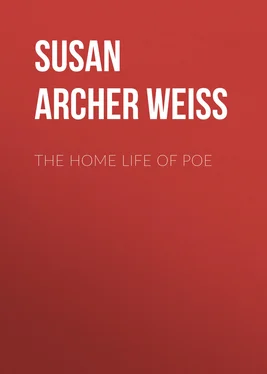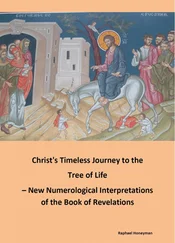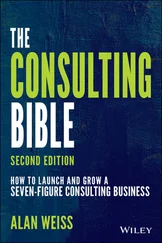Susan Archer Talley Weiss - The Home Life of Poe
Здесь есть возможность читать онлайн «Susan Archer Talley Weiss - The Home Life of Poe» — ознакомительный отрывок электронной книги совершенно бесплатно, а после прочтения отрывка купить полную версию. В некоторых случаях можно слушать аудио, скачать через торрент в формате fb2 и присутствует краткое содержание. Жанр: Биографии и Мемуары, foreign_antique, на английском языке. Описание произведения, (предисловие) а так же отзывы посетителей доступны на портале библиотеки ЛибКат.
- Название:The Home Life of Poe
- Автор:
- Жанр:
- Год:неизвестен
- ISBN:нет данных
- Рейтинг книги:4 / 5. Голосов: 1
-
Избранное:Добавить в избранное
- Отзывы:
-
Ваша оценка:
- 80
- 1
- 2
- 3
- 4
- 5
The Home Life of Poe: краткое содержание, описание и аннотация
Предлагаем к чтению аннотацию, описание, краткое содержание или предисловие (зависит от того, что написал сам автор книги «The Home Life of Poe»). Если вы не нашли необходимую информацию о книге — напишите в комментариях, мы постараемся отыскать её.
The Home Life of Poe — читать онлайн ознакомительный отрывок
Ниже представлен текст книги, разбитый по страницам. Система сохранения места последней прочитанной страницы, позволяет с удобством читать онлайн бесплатно книгу «The Home Life of Poe», без необходимости каждый раз заново искать на чём Вы остановились. Поставьте закладку, и сможете в любой момент перейти на страницу, на которой закончили чтение.
Интервал:
Закладка:
Another anecdote I recall illustrative of the strict discipline to which Edgar was subject.
My uncle, Mr. Edward Valentine, who was a cousin of Mrs. Allan, and often a visitor at her house, was very fond of Edgar; and liking fun almost as much as did the child, taught him many amusing little tricks. One of these was to snatch away a chair from some big boy about to seat himself; but Edgar, too young to discriminate, on one occasion made a portly and dignified old lady the subject of this performance. Mr. Allan, who in his anger was always impulsive, immediately led away the culprit, and his wife took the earliest opportunity of going to console her pet. As the child was little over three years old, it may be doubted whether the punishment administered was the wisest course, but it was Mr. Allan's way, who apparently believed in the moral suasion of the rod.
Edgar had no dogs and no pony, and did not ride out with a groom to attend him, "like a little prince," as a biographer has represented. At this time the Allans' circumstances were not such as to admit of such luxuries. As to his appearance in this style at the famous White Sulphur Springs, that is equally mythical. 3 3 Lest my mention of these little anecdotes and certain other matters should lead the reader to conclude that I am quoting from Gill, I would refer them to Appendix No. 1 of this volume.
There was, however, at least one summer when Edgar was six years of age in which the Allans were at one of the lesser Virginia springs, and in returning paid a visit to Mr. Valentine's family, near Staunton. This gentleman often took Edgar out with him, either driving or seated behind him on horseback; and on receiving his paper from the country post-office would make the boy read the news to the mountain rustics, who regarded him as a prodigy of learning. Thus far he had been taught by an old Scotch dame who kept an "infant-school," and who then and for years afterward called him "her ain wee laddie," and to whom as long as she lived he was accustomed to carry offerings of choice smoking tobacco. He also learned from her to speak in the broad Scottish dialect, which greatly amused and pleased Mr. Allan. The boy was at even this age remarkably quick in learning anything.
Mr. Valentine also delighted in getting up wrestling matches between Edgar and the little pickaninnies with whom he played, rewarding the victor with gifts of money. But there was one thing which no money or other reward could induce the boy to undertake, and this was to go near the country churchyard after sunset, even in company with these same little darkies. Once, in riding home late, Edgar being seated behind Mr. Valentine, they passed a deserted log-cabin, near which were several graves, when the boy's nervous terror became so great that he attempted to get in front of his companion, who took him on the saddle before him. "They would run after us and pull me off," he said, betraying at even this early age the weird imagination of his maturer years.
This incident led to his being questioned, when it was discovered that he had been accustomed to go with his colored "mammy" to the servants' rooms in the evenings, and there listen to the horrible stories of ghosts and graveyard apparitions such as this ignorant and superstitious race delight in. It is not improbable that the gruesome sketch of the " Tempest " family, one of his earliest published, whose ghosts are represented as seated in coffins around a table in an undertaker's shop, and thence flying back to their near-by graves, was not inspired by some such story heard in Mr. Allan's kitchen.
Undoubtedly, these ghostly narratives, heard at this early and impressionable age, served in part to produce those weird and ghoulish imaginings which characterize some of Poe's writings, and to create that tinge of superstition which was well known to his friends. He always avoided cemeteries, hated the sight of coffins and skeletons, and would never walk alone at night even on the street; believing that evil spirits haunted the darkness and walked beside the lonely wayfarer, watching to do him a mischief. Death he loathed and feared, and a corpse he would not look upon. And yet, as bound by a weird fascination, he wrote continually of death.
Edgar Poe, like every other Southern child, had his negro "mammy" to attend to him until he went to England, to whom and the other servants he was as much attached as they to him. Indeed, a marked trait of his character was his liking for negroes, the effect of early association, and to the end of his life he delighted in talking with them and in their quaint and kindly humor and odd modes of thought and expression.
Edgar had been about three years with the Allans when he was again deprived of a home and sent among strangers. Mr. Allan went on a business trip to England and Scotland, accompanied by his wife, Miss Valentine and Edgar; the latter of whom was put to school in London, where he must have felt his loneliness and isolation. Still, he came to the Allans in holiday times, and was with them in Scotland for some months previous to their return to Virginia. Little is known of them during this absence of five years.
CHAPTER IV
POE'S BOYHOOD
The Allans returned to Richmond in June, 1820, Edgar being then twelve years old. Having no house ready for their reception they were invited by Mr. Ellis, Mr. Allan's business partner, to his home on Franklin, then as now the fashionable street of the city.
Mr. Allan at once put Edgar to Professor Clarke's classical school, where he was in intimate association with boys of the best city families.
At the end of this year the Allans removed to a plain cottage-like dwelling at the corner of Clay and Fifth streets, in a quiet and out-of-the-way neighborhood. It consisted of but five rooms on the ground floor and a half story above; and here for some years they resided.
Of Poe as a schoolboy various accounts have been given by former schoolmates, with most of whom he was very popular, while others represent him as reserved and not generally liked. All, however, agree that he was a remarkably bright pupil, with, in the higher classes, but one rival, and that he was high-spirited and the leader in all sorts of fun and frolic.
Mrs. Mackenzie's eldest son, John, or "Jack," two years older than Edgar, though not mentioned by any of Poe's biographers, was the most intimate and trusted of all his lifelong friends. The two were playmates in childhood, and schoolmates and companions up to the time of Poe's departure for the University. Poe always called Mrs. Mackenzie "Ma," and was almost as much at home in her house as was his sister.
I remember Mr. John Mackenzie as a portly, jolly, middle-aged gentleman with a florid face and a hearty laugh. This is what he said of Poe after the latter's death:
"I never saw in him as boy or man a sign of morbidness or melancholy; unless," he added, "it was when Mrs. Stanard died, when he appeared for some time grieving and depressed. At all other times he was bright and full of fun and high spirits. He delighted in playing practical jokes, masquerading, and making raids on orchards and turnip-patches. Oh, yes; every schoolboy liked a sweet, tender, juicy turnip; and many a time after the apple crop had been gathered in, we might have been seen, a half dozen of us, seated on a rail-fence like so many crows, munching turnips. We didn't object to a raw sweet potato at times—anything that had the relish of being stolen. On Saturdays we had fish-fries by the river, or tramped into the woods for wild grapes and chinquepins. It was not always that Mr. Allan would allow Edgar to go on these excursions, and more than once he would steal off and join us, though knowing that he would be punished for it."
"Mr. Allan was a good man in his way," added Mr. Mackenzie, "but Edgar was not fond of him. He was sharp and exacting, and with his long, hooked nose and small keen eyes looking from under his shaggy eyebrows, always reminded me of a hawk. I know that often, when angry with Edgar, he would threaten to turn him adrift, and that he never allowed him to lose sight of his dependence on his charity."
Читать дальшеИнтервал:
Закладка:
Похожие книги на «The Home Life of Poe»
Представляем Вашему вниманию похожие книги на «The Home Life of Poe» списком для выбора. Мы отобрали схожую по названию и смыслу литературу в надежде предоставить читателям больше вариантов отыскать новые, интересные, ещё непрочитанные произведения.
Обсуждение, отзывы о книге «The Home Life of Poe» и просто собственные мнения читателей. Оставьте ваши комментарии, напишите, что Вы думаете о произведении, его смысле или главных героях. Укажите что конкретно понравилось, а что нет, и почему Вы так считаете.












